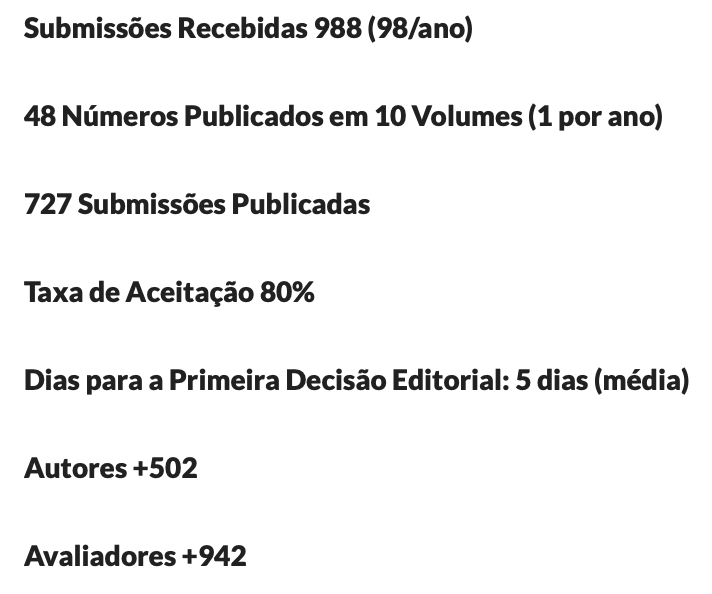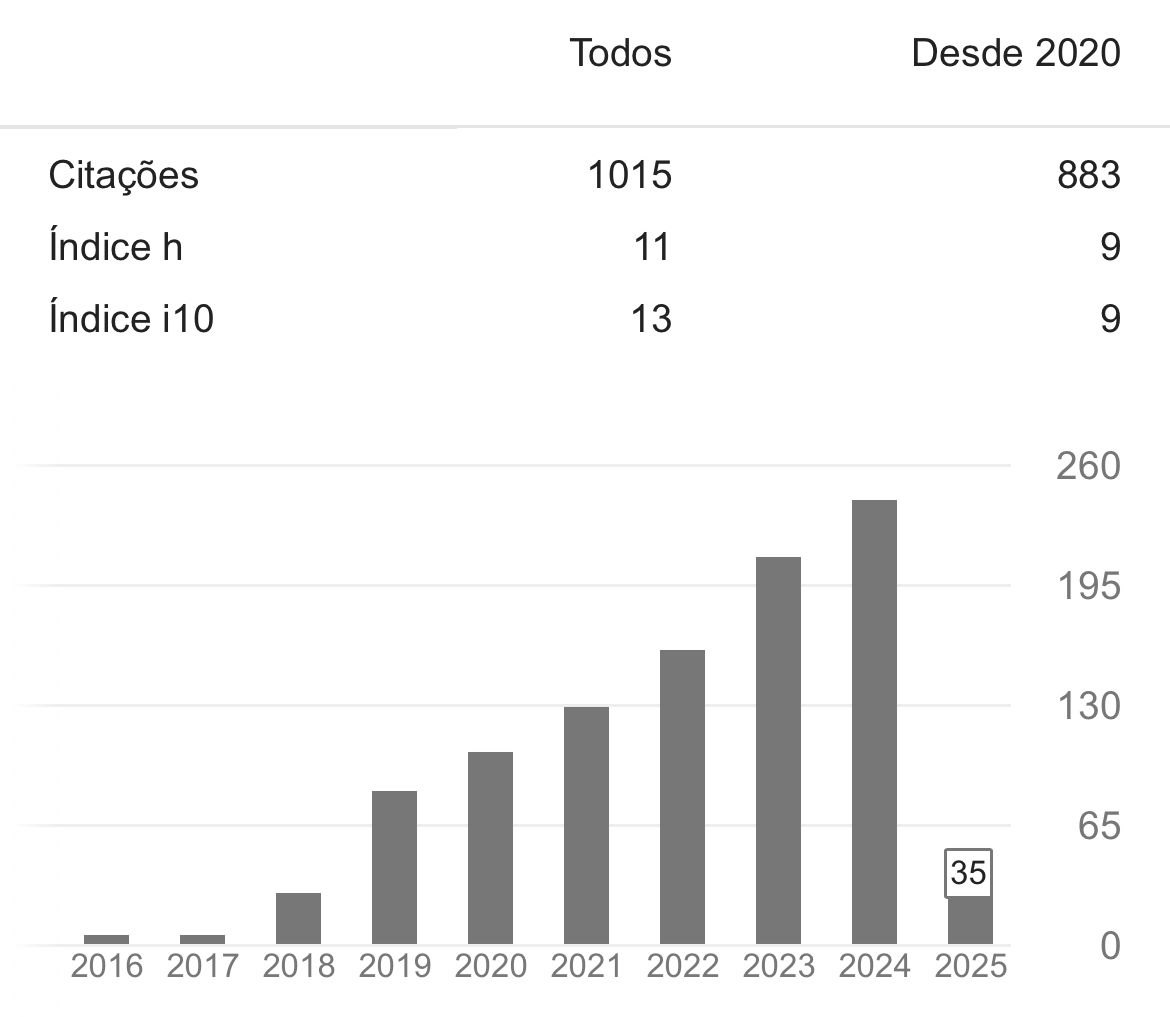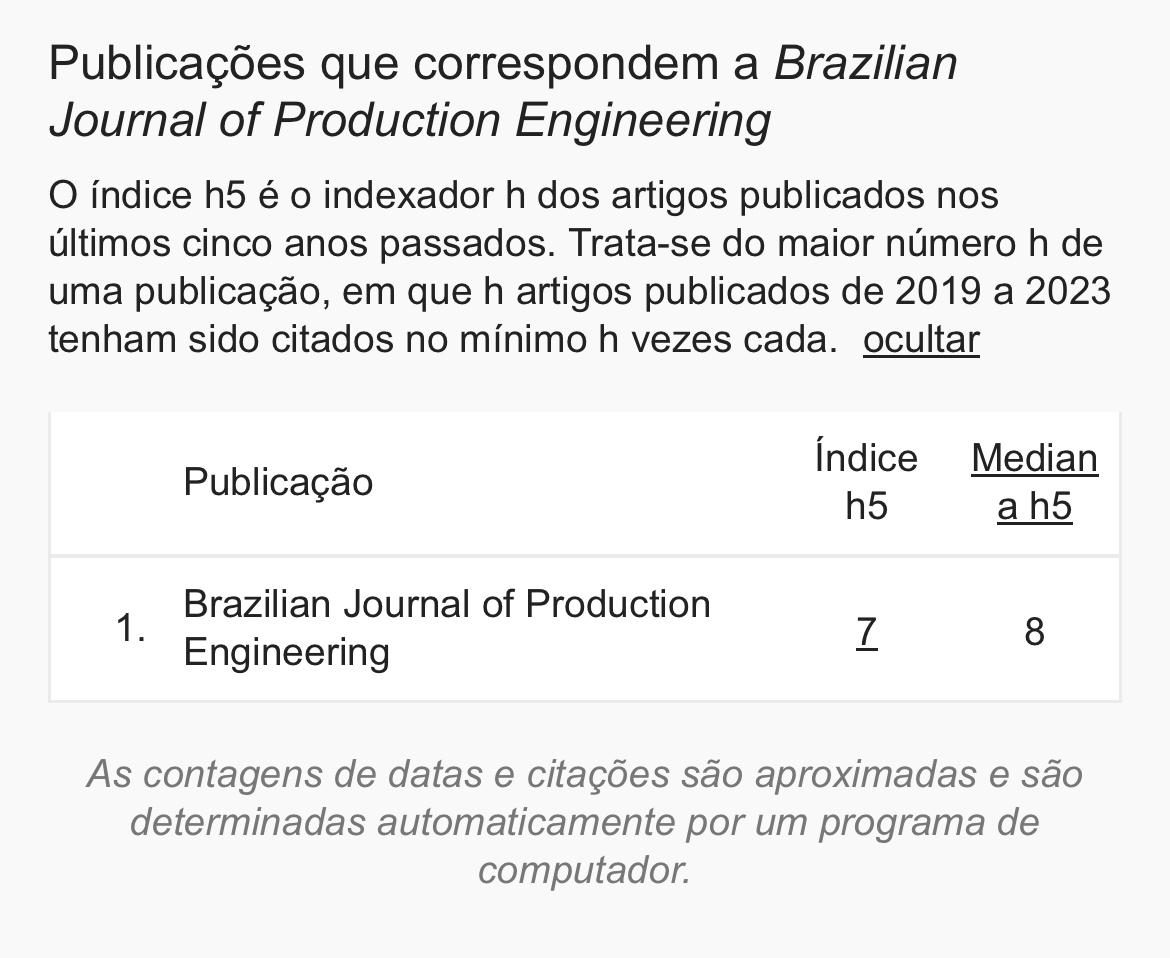Análisis de eficiencia del desarrollo sostenible en Brasil y países de la OCDE
DOI:
https://doi.org/10.47456/bjpe.v7i5.36133Palabras clave:
DEA, OCDE, Brasil, indicadores de sostenibilidad, Desenvolvimiento sustentableResumen
El desarrollo de un país no solo está relacionado con su crecimiento económico, ya que su desarrollo sostenible debe considerar aspectos sociales, económicos y ambientales. Este trabajo pretende medir y analizar la eficiencia de Brasil y los países de la OCDE (Organización para el Desarrollo Económico y la Cooperación) desde el punto de vista del desarrollo sostenible, dada la ambición actual de Brasil de ser parte de la OCDE. Este análisis utilizó un método de programación matemática denominado Data Envelopment Analysis (DEA), que permitió, utilizando el modelo SBM y el análisis de ventanas, evaluar la capacidad de los países para reducir los insumos (emisión de CO2, consumo de energía, tasa de desempleo e índice de Gini), así como el aumento de los productos (esperanza de vida, PIB, energía sostenible, saneamiento básico). La comparación entre países se basó en el ranking de eficiencia sostenible y los resultados de este estudio indicaron que Letonia y Chile son los más eficientes; y en cuarto lugar está Brasil. Además, se analizaron las holguras relativas y se concluyó que, si bien Brasil no es referente en ninguna variable, sus holguras son relativamente bajas. Se destaca que el índice medido es importante para contribuir a las discusiones relacionadas con la evaluación de la sostenibilidad de los países, ayudando a identificar aquellos con mejores prácticas en lo que se refiere a los aspectos sociales, económicos y ambientales; y orientar las decisiones de política respecto de los incentivos gubernamentales para promover el desarrollo de los países en busca de una producción más sostenible.
Descargas
Citas
Agenda 21 Global (1992). Integração entre meio ambiente e desenvolvimento na tomada de decisões. p.4. Rio de Janeiro. Retrieved from http://www.mma.gov.br/estruturas/agenda21/_arquivos/cap08.pdf
Apergis, N., & Payne, J. E. (2010) Renewable energy consumption and economic growth: Evidence from a panel of OECD countries. Energy Policy. 38, 656-660, ISSN 0301-4215, https://doi.org/10.1016/j.enpol.2009.09.002
Arndt, C., Arent, D., Hartley, F., Merven, B., & Mondal, A. H. (2019). Faster Than You Think: Renewable Energy and Developing Countries Annual Review of Resource Economics. 11(1), 149-168. Retrieved from https://www.annualreviews.org/doi/abs/10.1146/annurev-resource-100518-093759
Azar, C., Holmberg, J., & Lindgre, K. (1996) Social-ecological indicators for sustainability. Ecological Economics, 18, 89-11.
BNEF. (2015). Global Trends in Renewable Energy Investment 2015. Frankfurt am Main: Bloomberg New Energy Finance/Frankfurt School/UNEP Centre.
Bossel, H. (1997). Deriving indicators of sustainable development. Environmental Modeling and Assessment, 1, 193-218.
Camioto, F. C., Mariano, E. B., Santana, N. B., Yamashita, B. D., & Rebelatto, D. A. (2018). Renewable and Sustainable Energy Efficiency: An Analysis of Latin American Countries. Environmental Progress & Sustainable Energy. 37(6). https://doi.org/10.1002/ep.12877
Charnes, A., Cooper, W. W., Lewin, A. Y., & Seiford, L. M. (1994). Date Envelopment Analysis. Theory, Methodology and Applications. Springer Science & Business Media.
Coelli, T. J. et al. (2005). An Introduction to efficiency and productivity analysis. Ed. 2.
Cooper, W. W., Seiford, L. M., & Tone, K. (2006). Introduction to data envelopment analysis and its uses: with DEA-solver software and references. Springer Science & Business Media.
Dhahri, S., & Omri, A. (2018). Entrepreneurship contribution to the three pillars of sustainable development: What does the evidence really say? World Development, 106, 64-77.
Elkington, J. (1997). Cannibals with Forks: The Triple Bottom Line of Twenty-First Century Business. Oxford: Capstone Publishing Ltd.
Endenhofer, O. et al. (2008). Climate Change 2014: Mitigation of Climate Change, Contribution of Working Group III to the Fifth Assessment Report of the Intergovernmental Panel on Climate Change. Cambridge University Press. United Kingdom/ New York.
Gaspar, J. S., Marques, A. C., & Fuinhas, J. A. (2017) The traditional energy-growth nexus: A comparison between sustainable development and economic growth approaches. Ecological Indicators, 75, 286-296.
Jabbour, C. J. C., & Santos, F.C.A. (2009) Sob os ventos da mudança climática: desafios, oportunidades e o papel da função produção no contexto do aquecimento global. Gest. Prod., 6(1), 111-120.
Luukkanen, J. et al. (2019). Green economic development in Lao PDR: A Sustainability Window analysis of Green Growth Productivity and the Efficiency Gap, Journal of Cleaner Production, 211, 818-829.
Megyesiova, S, & Lieskovska, V. (2018). Analysis of the Sustainable Development Indicators in the OECD Countries. Sustainability, 10, https://doi.org/10.3390/su10124554
Minh, H., V., & Nguyen-Viet, H. (2011). Economic Aspects of Sanitation in Developing Countries. Environmental Health Insights. 5, 63-70. https://dx.doi.org/10.4137%2FEHI.S8199
Nações Unidas no Brasil. (2015). Transformando Nosso Mundo: A Agenda 2030 para o Desenvolvimento Sustentável. Retrieved from https://nacoesunidas.org/pos2015/agenda2030/
OECD. (2006). Good Practices in the National Development Sustainable Development Strategies of OECD countries. Paris. http://www.oecd.org/greengrowth/36655769.pdf
OECD. (2018). OECD Economic Surveys: Chile 2018, OECD Publishing, Paris. http://dx.doi.org/10.1787/eco_serveys-chl-2018-en
OECD. (2019). OECD Environmental Performance Reviews: Latvia 2019, OECD Environmental Performance Reviews, OECD Publishing, Paris. https://doi.org/10.1787/2cb03cdd-en
OECD. (2018). OECD Environmental Performance Reviews: Brazil 2018, OECD Environmental Performance Reviews, OECD Publishing, Paris. https://doi.org/10.1787/2cb03cdd-en
OECD. (2016). OECD Environmental Performance Reviews: Chile 2016, OECD Environmental Performance Reviews, OECD Publishing, Paris. https://doi.org/10.1787/9789264252615-en
Penedo, A. S. T., et al. (2016). International socio-environmental conferences and agreements: a thematic review. Revista em Agronegócio e Meio Ambiente, Maringá, 9(3).
Rashidi, K., Shabani, A., & Saen, R. F. (2015). Using data envelopment analysis for estimating energy saving and undesirable output abatement: a case study in the Organization for Economic Co-Operation and Development (OECD) countries. Journal of Cleaner Production. 105, 441- 252.
Santana, N. B., Mariano, E. B., Camioto, F. C., & Rebelatto, D. A. N. (2015). National innovative capacity as determinant in sustainable development: a comparison between the BRICS and G7 countries. Int. J. Innovation and Sustainable Development. 9 (3-4).
Sebastian, J., & Sebastian, W. (2016). Financial development and income inequality: a panel data approach. Empirical Economics, 51, 291-314.
Shafiei, S., & Salim, R. (2014). Non-renewable and renewable energy consumption and CO2 emissions in OECD countries: A comparative analysis. Energy Policy. 6, 547-556. http://dx.doi.org/10.1016/j.enpol.2013.10.064
Shen, Z., Boussemart, J., & Leleu, H. (2017). Aggregate green productivity growth in OECD’s countries. Int. J. Production Economics. 189, 30-39.
Song, M. L., Zhang, L. L., Liu, W., & Fisher, R. (2013). Bootstrap-DEA analysis of BRICS' energy efficiency based on small sample data. Appl. Energy. 112, 1049-1055
Sustainable Development. (2015). The 17 sustainable development goals. Retrieved from https://www.un.org/sustainabledevelopment/sustainable-development-goals/
Szopik, K. et al. (2018). The study of relationship in a hierarchical structure of EU sustainable development indicators. Ecological Indicators, 90, 120-131.
Thévenot, C. (2017). Inequality in OECD countries. Scandinavian Journal of Public Health. 45, 9-16. Retrieved from https://journals.sagepub.com/action/doSearch?target=default&ContribAuthorStored=Th%C3%A9venot%2C+Celine
Tone, K. (2001). A slacks-based measure of efficiency in data envelopment analysis. European Journal of Operational Research, 130(3), 498-509.
Tuon, L. (2020). O que falta para o Brasil entrar nos padrões da OCDE, o “clube dos ricos”. Exame. 18 jan. 2020. Retrieved from https://exame.abril.com.br/economia/o-que-falta-para-o-brasil-entrar-nos-padroes-da-ocde-o-clube-dos-ricos/
UN General Assembly. (2005). World Summit Outcome: resolution / adopted by the General Assembly. A/RES/60/1, 2005. Retrieved from https://www.refworld.org/docid/44168a910.html
United Nations. (1987). Our common future: World Commission on Environment and Development. Oxford University Press. Retrieved from https://sustainabledevelopment.un.org/content/documents/5987our-common-future.pdf
United Nations. (2012). The future we want: Outcome document of the United Nations Conference on Sustainable Development. Rio de janeiro. Retrieved from https://sustainabledevelopment.un.org/content/documents/733FutureWeWant.pdf
Van Bellen, H. M. (2002). Indicadores de Sustentabilidade: Uma Análise Comparativa. 2002. 235f. Tese de Doutorado em Engenharia de Produção, Universidade Federal de Santa Catarina, Florianópolis.
Wang, K., Lu, B., & Wey, Y.M. (2013). China's regional energy and environmental efficiency: arrange-adjusted measure-based analysis. Applied Energy. 112, 1403-1415. Retrieved from https://www.researchgate.net/deref/http%3A%2F%2Fdx.doi.org%2F10.1016%2Fj.apenergy.2013.04.021
Wang, Y. M, & Chin, K. S. (2010). Some alternative models for DEA cross-efficiency evaluation. Int. J. Production Economics. 128, 332- 338.
Wilson, J. P. (2014). The triple bottom line Undertaking an economic, social, and environmental retail sustainability strategy. International Journal of Retail & Distribution Management. 45(4/5), 432-447.
World Bank. (2020). World Development Indicators. 2020. Retrieved from http://datatopics.worldbank.org/world-development-indicators/
Xie, B, C., Bai, C., Shang, L.-F., Yang, S.-B., & Yi, B. W. (2014). Dynamic environmental efficiencyevaluation of electric power industries: evidence from OECD (Organization for Economic Cooperation and Development) and BRIC (Brazil, Russia, India and China) countries. Energy, 74, 147–157.
Zafar, M, W., Shabaz, M., Sinha, A., Sengupta, T., & Qin, Q. (2020). How renewable Energy Consumption Contribute to Environmental Quality? The Role of Education in OECD Countries. Journal of Cleaner Production. 268, 2020.
Zhou, H., Yang, Y., Chen, Y., & Zhu, J. (2018). Date envelopment analysis application in sustainability: The origins, development and future directions. European Journal of Operational Research. 264, 1-16.
Zhou, P., Ang, B. W. (2008). Linear programming models for measuring economy-wide energy efficiency performance. Energy Policy. 36, 2911-2916.
Descargas
Publicado
Cómo citar
Número
Sección
Licencia
Derechos de autor 2021 Brazilian Journal of Production Engineering - BJPE

Esta obra está bajo una licencia internacional Creative Commons Atribución-NoComercial-CompartirIgual 4.0.

















































































